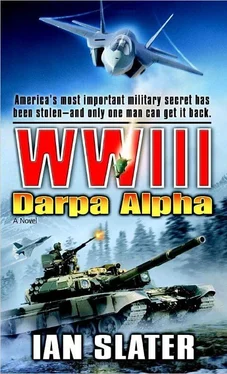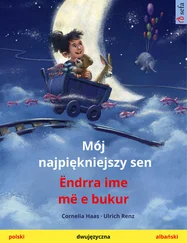As usual in the group, the general had allowed each member of the team, with the exception of Aussie, to select his own weapon. Lieutenant Johnny Lee, the multi-linguist, Gomez, and Eddie Mervyn liked the Heckler Koch MP5 navy version. With its closed bolt action, unlike its open bolt cousin that begins firing when the bolt is “triggered” forward, the navy version fires with the bolt already forward, reducing any aim-altering shoulder bump. And, while weighing only 7.7 pounds, it has an effective kill range of 328 feet firing 9 mm ammo.
It was left to Aussie Lewis, at the general’s request, to tote a standard Heckler Koch G36 assault rifle fitted with an under-barrel launcher that could fire up to ten 40 mm grenades a minute to a distance of approximately 300 yards. The eighth member of the team, Tony Ruth, an ex-Ranger who had stayed in the kind of top physical condition Freeman always demanded of his team members, came along at Aussie’s invitation. Tony Ruth had met Aussie Lewis in Iraq, in Karbala. His favorite weapon was an Italian Franchi eight-round SPAS — sporting purpose automatic shotgun.
No, Tony Ruth had told the other members of the SpecWar squad, and anyone who ever challenged him — and a lot of people had — he wasn’t any relation to Babe Ruth. Yes, he had played in the minors, and worked one game in the majors. Then Iraq came a year before his retirement. Yes, he sure did intend to go back to North Carolina and play ball, but the example of Pat Tillman, the twenty-seven-year-old offensive lineman for the Arizona Cardinals who had walked away from a $3.6-million, three-year contract in the NFL because he believed it was time to serve his country and who was killed in action in a blue-on-blue in Afghanistan in June 2003, had had a great influence on Tony Ruth, as it had on a lot of other Americans, and he’d met Douglas Freeman through Aussie not long after the SpecWar team lost a member on a SpecWar op off the “Hermit Kingdom”—the North Korean coast.
“Hey, Tony,” Aussie called out, pointing to the Franchi shotgun, “why not haul a Mossberg instead of taking that old Italian job? Holds nine rounds instead of eight. You never know when that extra cartridge—”
“Yeah—” riposted Tony. “But if you’ve already had to fire eight rounds of buckshot or door-bashing slugs, you’re in so much trouble you don’t need an extra round, you need a medic. Fast.”
“Ah-ha!” said Salvini. “He’s got you there, Aussie.”
“Oh, shut your face, wop! I’d still bet on a Mossberg.”
“You’d bet on anything,” said Sal.
“Sal’s right,” Choir Williams told Tony Ruth. “Last mission we were on, Aussie was sound asleep aboard the transport until he heard someone mention a ‘bet.’”
“That is correct,” chimed in Freeman, always happy to see such good morale en route to a mission that his gut instinct told him would stress the nerves and physical fitness of his seven fellow commandos to the max. “Aussie could hear the word ‘bet,’” Freeman said, “even if it was whispered at a rock concert.”
“I don’t go to rock concerts,” said Aussie, sniffing. “I’m more cultured than you bastards.”
“Oh,” said Sal. “How about that cultural movie we saw the other night? That blonde with the big—”
“A question of good photography,” said Aussie, affecting a high-minded, dismissive air. “It wasn’t the young lady’s cleavage that interested me. It was the interpretive angle of the shot and the — ah — subtle arrangement of her wardrobe I was viewing.”
“What are you talking about?” said Salvini. “She was naked!”
“Nevertheless,” Aussie began, then paused. “Oh, you peasants wouldn’t understand.”
“Oh?” joshed Ruth. “Well, tell me, professor , what would your wife say if she’d seen you ‘viewing’?”
“Well,” Aussie answered slowly, “I think, Mr. Ruth, that she would cut me off for a month!”
Everyone laughed, though Freeman’s mirth was restrained by recalling how he might still be in the proverbial doghouse for having to leave his wife so abruptly on the mission, especially so soon after their donnybrook vis-à-vis Marte Price.
As the general reached forward to pat Prince once more, he felt the one-shot pen in his pocket. This time it wasn’t loaded with a rubber stun bullet but a lethal round. He hoped that all the other equipment in the team’s “goodies” packs, provided by DARPA, and the other off-the-shelf wares of war would be as efficient.
“Two minutes!” announced the Chinook’s loadmaster as the amber light began flashing.
“Brace!” and each of the eight commandos readied themselves for a hard landing. Choir held Prince to his chest, the dog, now strapped into his Velcro-hitched hagvar vest, happily licking Choir’s face as the Chinook’s rear wheels touched down in what sounded like a hailstorm as gravel and sand kicked up by the rotors’ fierce downdraft struck the Chinook’s fuselage.
Within a minute every man, with his pack, and Prince were on the hard ground of the DARPA base, and Freeman was being greeted by a somber-looking sheriff from Sandpoint, the wilderness resort area of about five thousand souls at the top of the lake twenty-seven miles north of the naval research station.
“Bad business,” said the sheriff glumly.
“It is,” said Freeman. “First thing I need to do is talk to the staff here at DARPA.” Away from the exhaust and dust, the general could breathe more deeply, taking in the damp coolness of the mountain lake. Prince had already been doing this, his tongue lolling expectantly, a distinct smile on his face. He loved tracking, though at the moment all he could smell was baking soda, the result of a standing order from Freeman for his men to eschew any deodorant to combat the sweating in armpit and groin. The soda, unlike deodorants, including those that commercials boasted were unscented, was neutral and would help absorb the smell of their perspiration.
“We threw up roadblocks,” the sheriff assured him, “all around the area north, south, and west of the research station. And we sent boats across to the eastern side of the lake. All sides covered. But there was nothing. Highway patrols were alerted on the Washington state, Montana, and British Columbia borders, so they didn’t get out that way. But they had mountain bikes, you know.” He pointed to where his deputy had found the mountain bike tracks up beyond the high hurricane-strength fence. “But they left them behind.”
“Which way do you think they’re headed, Sheriff? Your best guess?”
“I’d say north — Canada.”
“Yep. So would I,” said Freeman. The general paused, looking out across the metallic gray lake under the gathering gray stratus. “Everyone’s expecting them to be hightailing it in cars or a plane. How about that, Sheriff — a plane?”
“General, we shut down everything. No planes out from Sandpoint except for an emergency airlift of a hiker to Spokane. He broke his leg on one of the islands in Priest Lake farther north of here. Had to bring a float plane for him but he’s a local. I know him. ’Sides, I double-checked. Only the pilot and him aboard. Locals — know ’em both.”
Freeman slapped the sheriff on the back by way of appreciation. “You’ve done good work, Sheriff. It’ll go in my report.”
The sheriff nodded appreciatively, then added grimly, “Ten people murdered in cold blood. Like a family.”
“Ten?” queried the general. “I was told there were eleven.”
“No, seemed so at first, but one of ’em, Roberta Juarez, a technician, survived. Massive head injuries but she’s holding on. With a head injury like that, they no doubt figured she was dead.”
Читать дальше












